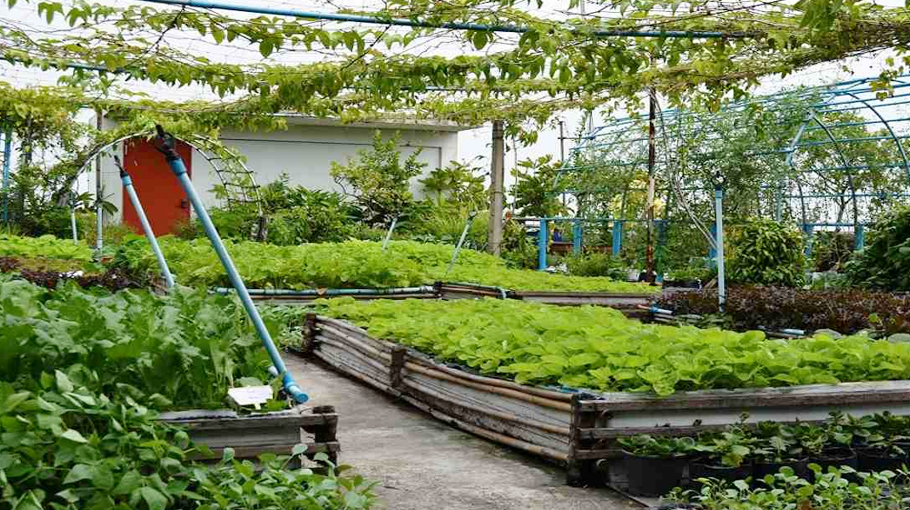Commercial rooftop farming gains ground

The country’s agriculture is now heading towards cities. And the future generation will mostly depend on urban agriculture as an alternative to their professions.
Nowadays, youths are now renting different roofs across the capital for rooftop agriculture. With this initiative, a separate ecosystem is being developed in cities, said agriculture expert and media personality Shaikh Siraj.
He said, “I started rooftop agriculture back in 1980 with the ‘Kazi Guava.’ But now rooftop agriculture has included many other fruits, vegetables, and fish. As the arable land is decreasing gradually, agriculture on rooftops can meet our growing food demand. Young people are now mostly showing their interest in it.”
“Besides, groups of young people have already started rooftop farming after renting a roof in different areas of the capital. This is helping to meet the daily vegetable demand of a particular area. As now people mostly want to have fresh vegetables, this has been a great relief for them,” he added.
To meet the growing demand for fresh vegetables in the city, rooftop gardening will be the game-changer. On the other hand, as the leafy vegetables demand for fast food lovers is also increasing, rooftop gardening can be an alternative to meet the growing demand.
As a result of urbanization including the construction of houses, roads, shops, industries for the growing population, the amount of arable land is decreasing day by day. According to information, with the increase in population, the amount of land decreases by about one percent every year. Therefore, in order to meet the food needs of the growing population, it is necessary to increase food production.
In this regard, the agriculture expert said, “The idea of rural agriculture as well as urban agriculture has come up for more food production. When it comes to urban agriculture, it is really about rooftop gardens. If we can bring more roofs under agriculture, we may get relief out of arable land shortages. This can bring a revolution in food production.”
For the past few years, the Department of Agriculture has taken cognizance of Sheikh Siraj's silent revolution. The government started ‘Demonstration of Roof Agriculture, Kitchen Compost and Drip Water Irrigation’ under the ‘Urban Agriculture Production Support (Pilot) Project’.
Recently, following the success of the Urban Agriculture Production Support (Pilot) Project, the authorities concerned are now looking forward to taking such projects to other big cities across the country.
When asked whether there are any disadvantages, he replied, “There are some rumors that roof gardening increases mosquitoes breeding, which is absolutely false. There is no chance of water stagnation in roof gardening. Rather, for gardening one has to regularly clean the garden.”
At present, those who are engaged in roof farming use organic manure and household waste as plant nutrients. Organic household waste is composted on the roof in a small range and if applied to trees, it will greatly reduce the pressure of household waste in the city.
This type of gardening is now helping to reduce city warming. Roof gardening in urban areas will provide pesticide-free fresh vegetables for the family as well as people can spend their leisure time cultivating on the roof. People will find peace of mind. Roof farming will produce vegetables as well as get pure oxygen.
In rooftop gardening, various exotic vegetables including cherries, strawberries, American lettuce, native winter and summer vegetables can be cultivated. Different types of medicinal herbs like mint, and basil grow well in it. Various vegetables including leafy vegetables, Potato, Bean, string bean, bitter gourd, sponge gourd, Red Spinach, Tomato, Papaya, Lettuce, Eggplant, Turnip give good yield in this method.
At present, those who are engaged in roof farming use organic manure and household waste as plant nutrients. Organic household waste is composted on the roof in a small range and if applied to trees, it will greatly reduce the pressure of household waste in the city.
To prevent wastage of water in roof farming, recycling of water, the establishment of fish and plant nutrition cycle, cultivation of natural fish food, cultivation of ornamental aquatic plants, innovation of native colorful fish species, improvement of native ornamental fish color, breeding of colorful fish, cultivation of other exotic fruits including dragon fruit are recommended. Research is underway on the use of husk and coconut husk as an alternative to soil, making eco-friendly composting units on the roof, which will integrate the country's roof farming, he hoped.



